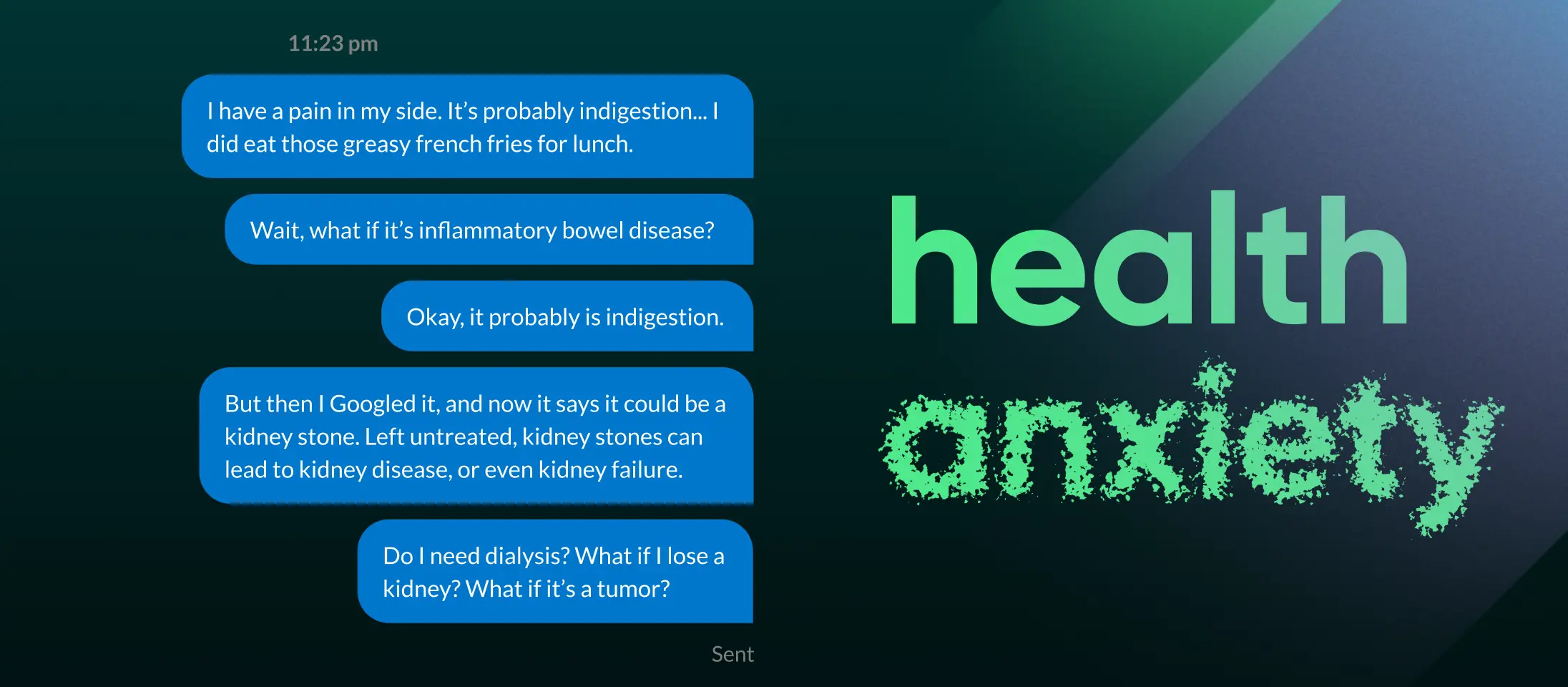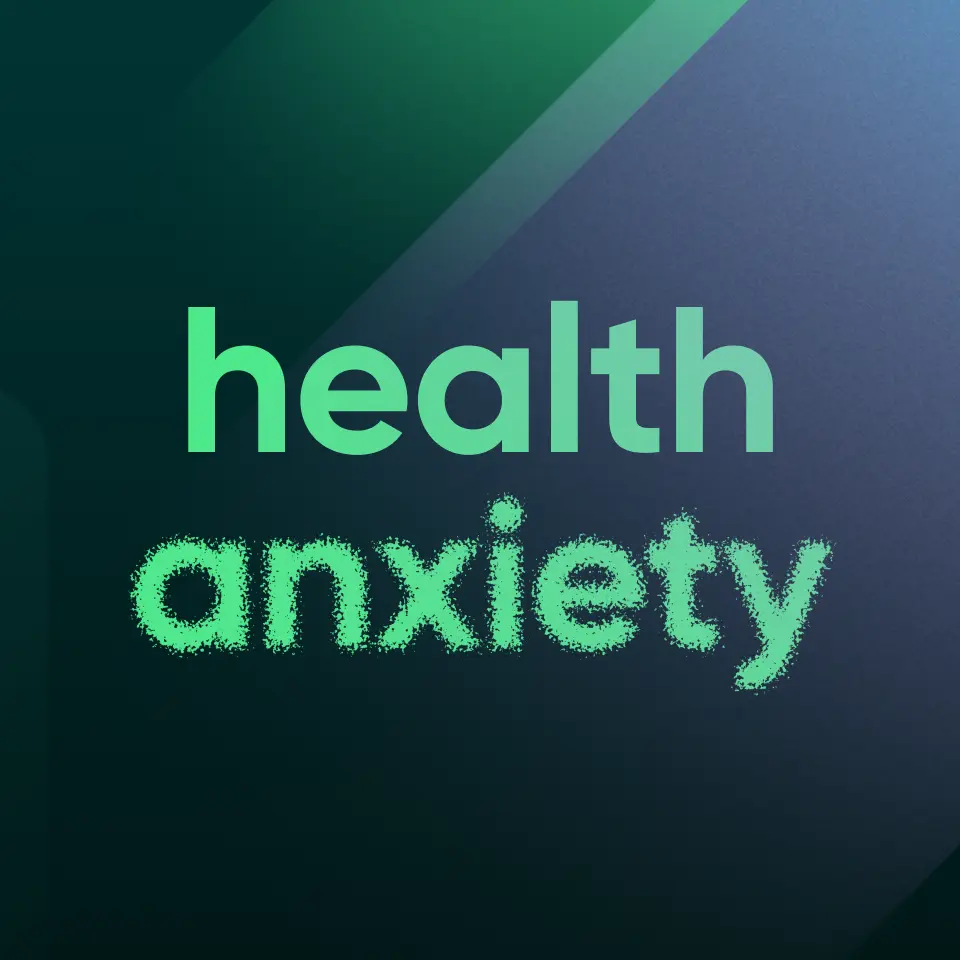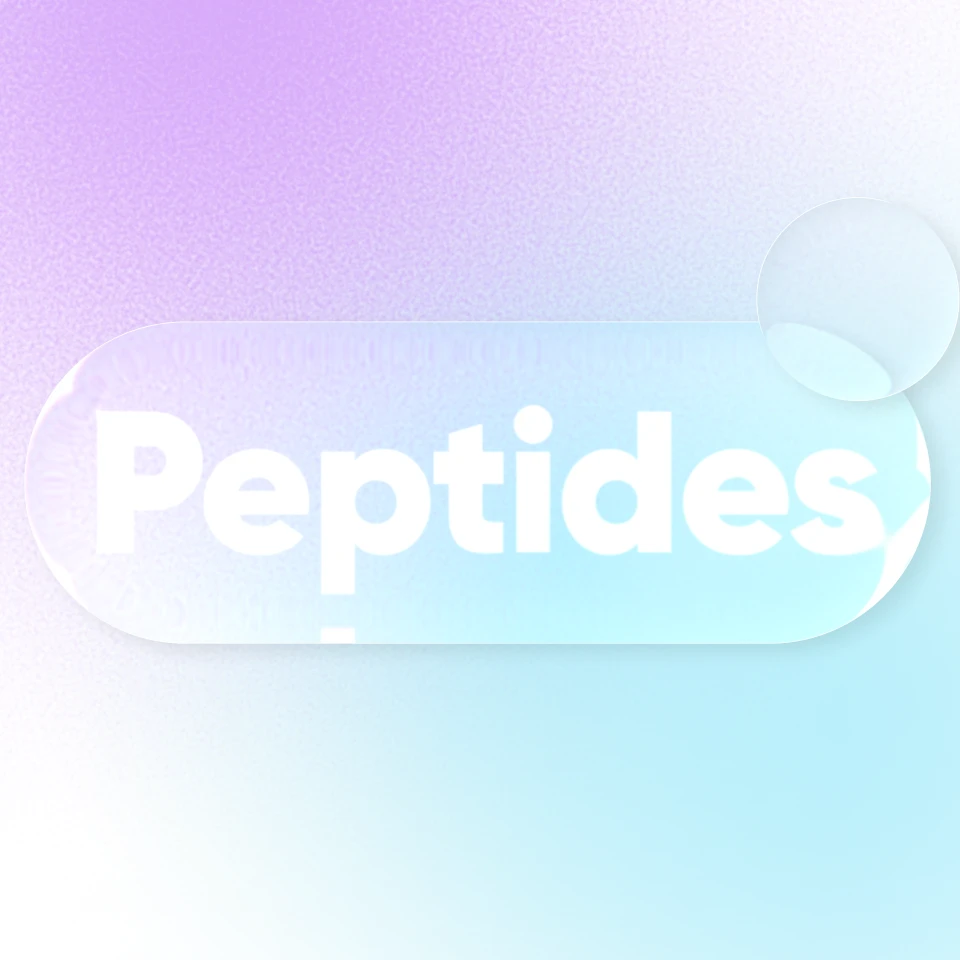Many people suffer from some version of health anxiety. Here’s what to know.
I have a pain in my side. It’s probably indigestion—I did eat those greasy French fries for lunch. But wait, what if it’s inflammatory bowel disease? Okay, it probably is indigestion. But then I Googled it—and now it says it could be a kidney stone. Left untreated, kidney stones can lead to kidney disease—or even kidney failure. Do I need dialysis? What if I lose a kidney? What if it’s a tumor?
We’ve all had those moments when a strange twinge turns into a full-blown Internet doomscroll session. Fortunately, that’s normal. But when these instances happen more often – and if they start to interfere with your daily peace of mind – it could be a sign of health anxiety.
Health anxiety is often misunderstood or minimized – brushed off as someone simply being “a hypochondriac.” But experts note that it’s a very legitimate psychological condition – and one that’s on the rise.
How common is health anxiety?
Health anxiety was once commonly called hypochondria. Today, the Diagnostic and Statistical Manual of Mental Disorders (DSM-5), published by the American Psychiatric Association, classifies it under two related conditions:
- Illness anxiety disorder, which is diagnosed when someone is excessively worried about having or developing a serious illness but has few or no physical symptoms
- Somatic symptom disorder, which occurs when significant physical symptoms are accompanied by excessive thoughts, feelings, or behaviors related to the symptoms.
While it might feel like you’re spiraling, health anxiety is something that many people experience. It’s diagnosed in 2.1% and 13.1% of the general adult population, with even higher rates (up to 19.9%) in clinical settings. This condition also became more prominent in recent years, with rates skyrocketing during the COVID-19 pandemic due to increased media exposure, fears of infection, and more limited access to healthcare services.
As health anxiety exists on a spectrum, most people have some degree of it, whether it’s occasional bouts of “is that headache a sign of something more serious?” to persistent daily thoughts about worst case health scenarios that interfere with your daily life. And while many anxiety conditions affect women more commonly than men, health anxiety tends to be nondiscriminatory when it comes to sex, affecting everyone equally.
Signs you might have a form of illness anxiety disorder
Think you may have some form of health anxiety? Here are some ways in which it can manifest:
- Constant worry about having or getting a serious disease or health condition
- Worrying that every minor symptom or sensation in the body means something serious
- Not feeling reassured from doctor visits or even negative test results
- Anxiety about potential illnesses getting in the way of everyday life
- Frequently making medical appointments for assurance
- Avoiding routine medical appointments for fear of receiving bad health news
- Cyberchondria - aka excessively scouring the Internet for possible causes and symptoms of health conditions
- Avoiding people and places due to fear of health risks
- Constantly talking about your health and potential illnesses
Why it’s so hard to talk about
One of the biggest challenges with health anxiety is that it is often misunderstood. People experiencing persistent stress over developing a health condition may be ridiculed or told it’s all in their heads. This diminishes the very real fears and anxieties they face.
Seeing a doctor doesn’t always bring an accurate diagnosis or helpful solutions. Some providers may interpret patient concerns as overreaction—especially when symptoms are vague or hard to measure. Signs of health anxiety can overlap with physical and mental symptoms, making it hard for doctors to pinpoint exactly what a patient is dealing with. And some may lack a thorough understanding of illness anxiety disorder, leading them to dismiss patients. As a result, many people battling this condition are left feeling ignored and caught in a loop of catastrophizing thoughts. And when your symptoms are questioned, your anxiety only compounds.
The risks of ignoring it
Untreated, health anxiety can lead to constant stress and anxiety that takes a toll on your physical and mental health.
Related: How Stress Affects Your Entire Body
This anxiety can become debilitating, affecting everything from your job to your relationships to your overall well-being. Constantly seeking health reassurance can also lead to financial strain from medical tests, missed workdays from continuous appointments, and in extreme cases can even affect your ability to hold down a job. Research shows that illness anxiety disorder can even evolve into additional mental health conditions such as generalized anxiety disorder, depression, or even obsessive-compulsive disorder (OCD). And people with anxiety disorders are at a greater risk of developing substance use disorders.
The good news? With proper care, health anxiety is highly treatable
If you live with health anxiety, there are ways to cope. Here are some strategies that may help to alleviate your symptoms.
- Differentiate between helpful vigilance and harmful fixation: Aim to stay on top of your health by maintaining regular checkups and focusing on preventive care. Strive to avoid excessive symptom-checking or obsessive Googling that fuels health spiraling.
- Make a plan with your doctor: Work with a healthcare provider to create a personalized schedule of recommended health screenings—like mammograms, colonoscopies, and bloodwork—based on your age, family history and individual risk factors. Having a clear plan in place can help ensure you're staying ahead of potential issues rather than reacting to them.
- Limit symptom-checking: Put some parameters around how often you allow yourself to Google symptoms. Set specific times for checking health information – for instance give yourself 20 minutes to browse at the end of the workday – and limit your information seeking sessions to those hours.
- Use reputable sources: When searching for information, look at reputable medical websites like the Mayo Clinic, Cleveland Clinic, National Institute for Health and Centers for Disease Control. Patient-led forums, like Reddit, can be filled with other people catastrophizing and aren’t always the most accurate information.
- Focus on what you can control: Take steps to eat a healthy diet, exercise, stay hydrated, maintain an active social life and get sleep. Remind yourself that you are doing things that are good for your body and that in doing this, you are prioritizing your health.
- Take up some calming practices: Mindfulness, journaling and guided breathing can help the body to relax and may help you to feel less anxious and more in the moment.
- Get help: If things feel too overwhelming to manage on your own, seek out the help of a therapist. In fact psychotherapy is recommended as the first line treatment. Cognitive Behavioral Therapy (CBT) in particular can provide you with helpful ways to manage thoughts so they don’t become too much to manage.
- Consider medications: Some patients find relief through medications such as antidepressants.
- Book a whole body Prenuvo scan: In under an hour, check for hundreds of conditions before symptoms appear, helping you get ahead of potential issues and easing health concerns.
A better way to understand your body
One common thing many people with health anxiety struggle with is uncertainty — that lingering feeling that your body might be hiding something you don’t know about. A Prenuvo whole body scan can be a valuable tool in managing that anxiety by providing the clarity you’ve been looking for. It’s not about fueling your fears; it’s about helping you move forward with confidence.
Recommended Reading: The Current Reactive Healthcare System Fuels Your Health Fears — Here’s How to Overcome it
For those of us stressing over all the what-ifs, there’s nothing more comforting than the peace of mind that comes from knowing what’s going on inside our bodies. Prenuvo empowers patients to help catch conditions early — often before symptoms even appear. And for many, it’s a way to ease worry and gain some much-needed reassurance.
Unlike many diagnostic tools, Prenuvo scans are radiation-free and non-invasive. And they’re designed for early detection — to alert you to anything that may be developing before it becomes a crisis. That kind of insight can help you live your healthiest life, whether it means catching something early or simply breathing a sigh of relief that your body is in balance.
If you are one of the many people who struggle with health anxiety, it doesn’t mean there’s something wrong with you. It means you care deeply about your body and your health. That’s not a flaw; it’s something to honor. The key is shifting your focus to what you can control, such as preventative care, mindfulness, therapy, and tools like proactive scans — so you can move from spiraling to steady.
If your brain jumps to the worst-case scenarios, you’re not broken. You might just need a better system for understanding your body—with clarity, not fear.
To learn more about the benefits of a whole body scan, book a call to discuss with a member of our care team.








